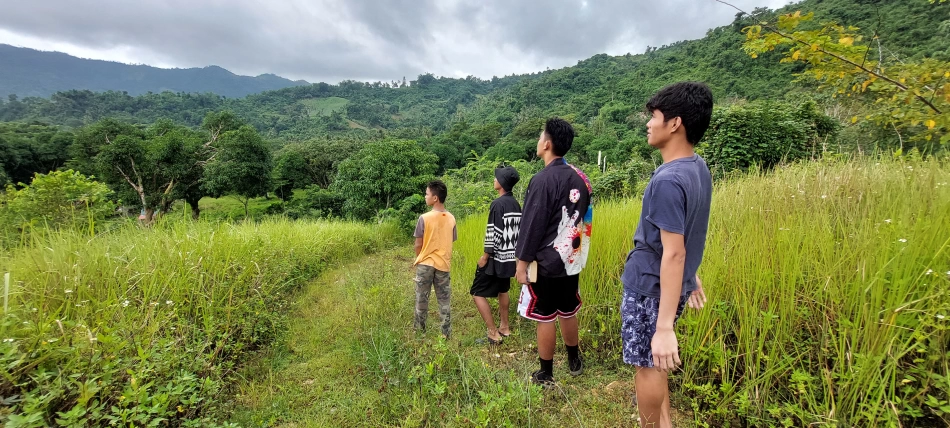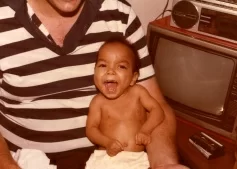 without a thought on my part. But Luke came to my mind yesterday and I looked up some information on him and discovered that his birthday had just passed. I found this old article that I wrote about Luke a few years ago. I thought I'd share it again. I am convinced that there are important and significant lessons we can learn from his life, and that I need to regularly share what I think they are. I hope you enjoy this!
without a thought on my part. But Luke came to my mind yesterday and I looked up some information on him and discovered that his birthday had just passed. I found this old article that I wrote about Luke a few years ago. I thought I'd share it again. I am convinced that there are important and significant lessons we can learn from his life, and that I need to regularly share what I think they are. I hope you enjoy this!The mysteries of God are a part of the Christian life that can often lead to confusion, doubt and even discouragement for believers.
- For some, it's a pride thing. We want to have answers – we want to understand, to be able to grasp the complexities of Biblical truth and God's plan for mankind.
- For some, God's mysteries – the unexplained things of life – are stumbling blocks to faith:
1. Why do bad things happen to good people?
2. Why does He allow pain, suffering and evil to thrive in our world?
Several months ago we were witnesses to the aftermath of the tragedy in Pennsylvania involving the Amish community, where, good, decent, hard working, non violent people were subjected to unspeakable cruelty towards their children. How can this happen?
3. One of our CSC children, who grew up in the worst poverty imaginable in Cebu City, was adopted into a family in the United States several years ago. Well meaning people would tell her how lucky she was and how God obviously had a wonderful plan for her life. She had a hard time with that and would sometimes ask her parents, "But what about all the kids who are still there, who weren't adopted, and who are still suffering and dying? What is God's wonderful plan for their lives? Why me and not them?
For many of us, we celebrate the goodness of God in our lives, we praise him for his healing, for material comforts, for blessing our efforts – even as we observe people who remain sick or disabled, who suffer in poverty – those who efforts and initiatives end in disappointment and ruin.
There are two extremes in terms of people's reactions to the things about God and life that are not understood.
1. There are those who try in vain to grasp the ungraspable – to be able to reduce the mysteries to understandable formulas or explanations. I remember a young seminarian who came to Cebu and who filled the pulpit of our church on a Sunday evening. He preached for an hour on the "peace of God that passes all understanding." Perhaps he felt that if he preached long enough he could crack that nut and open our understanding!
We all know those who have reduced the book of Revelation to precise charts and timetables, giving us easy to understand categories for all of human history and, most especially, the times to come.
2. A second category are those who shake their heads and say, "We'll only know these answers when we get to heaven." They suspend inquiry, not bothering to seek answers to the perplexing questions of life.
Living and working in a Third World country like the Philippines brings some of these mysteries to the front of our lives. Poverty, and all that goes with it, is "in your face." People often ask me "How do you like living in the Philippines?" That's a tough one to answer. Life anywhere has its highs and lows. Some days are great, others are difficult. I often answer this way:
1. When I'm sitting down to a nice breakfast I am aware that, within a few meters of my house are families that have no breakfast.
2. When I'm driving to the office or the Shelter I often pass people walking along the road who, for lack of a few cents can not even afford public transportation and must walk.
3. When I stop to buy medicine for my family or the CSC kids, there are people standing nearby whose children are dying for lack of that very same medicine.
Why am I blessed and they are not?
I recall a conversation with a missionary a few days after Cebu was hit by a strong typhoon. Many of our CSC workers lost their roofs or their entire homes. The houses of the poor were devastated by the high winds and torrential rains. The missionary said that it had been such a miracle how God spared the missionary homes from damage, holding his hands of protection around us during the storm. I remember wondering whether it wasn't more a matter of our having cement houses and strong metal roofs.
Why did our CSC kids have to suffer so much? And how much more, those who live on the street and cannot be admitted to CSC?
These are tough questions. When it comes to trying to understand our own suffering, the Bible gives some answers. For example, Romans 5:3-4 tells us that suffering produces perseverance, perseverance character, and character, hope. And the Bible gives us additional hope that we will someday come to see God's purpose and mysteries:
"But now we see through a glass dimly, but then face to face."
And we hear the testimonies of Christian brothers and sisters who have lived through terrible times and have turned negatives into positives in their lives.
Several months ago I was attending a conference in Bismark, North Dakota. One of the featured speakers was Steve Saint, Steve's father, Nate Saint, was one of the five missionaries killed in 1956 by Aucan warriors in Equador. Steve told about what that tragic day meant to his family, and what it was like when his dad, his hero, didn't come home that day. We saw video of his current family life, and saw a man who was interacting with Steve's children, and who was being referred to as "Uncle." It turns out that this was the very man who had killed Steve's father, who had come to know Jesus and had experienced the forgiveness of God and of the Saint family and now was a part of their family – an amazing story of how good things had come out of tragedy and suffering.
So the clear message is that God has a plan for our lives, we will discover that plan in the right time. He is writing our life's stories, but some of the chapters are difficult ones.
We can understand this. We can, when aided by the Holy Spirit, see how difficulties and suffering are part of a purification process for us, and that we, like Job, will eventually be better people for it.
But what about people who, because of major disabilities, are unable to understand their situation, unable to discern the hand of God or his plan for their lives. Where is the purification and growth and ultimate value for these people? What could God's purpose possibly be?
Back on 1982 a baby was born in a charity ward in a small hospital in Cebu City. 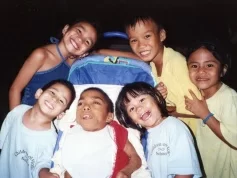 The baby underwent cardiac arrest during birth and was without oxygen for an extended time. Unlike many cases of charity patients, the hospital staff decided to resuscitate the baby, even after he had suffered massive brain damage and cerebral palsy. The baby's mother abandoned him in the hospital, and after a couple months Luke was referred to CSC. When we took him in he appeared to be a bouncing baby boy. We did not know that he would not develop physically beyond about a year and a half, or mentally beyond a few months. Luke would never speak, nor have voluntary movement of his arms or legs.
The baby underwent cardiac arrest during birth and was without oxygen for an extended time. Unlike many cases of charity patients, the hospital staff decided to resuscitate the baby, even after he had suffered massive brain damage and cerebral palsy. The baby's mother abandoned him in the hospital, and after a couple months Luke was referred to CSC. When we took him in he appeared to be a bouncing baby boy. We did not know that he would not develop physically beyond about a year and a half, or mentally beyond a few months. Luke would never speak, nor have voluntary movement of his arms or legs.
Luke became a fixture at CSC. For over 23 years he was an integral part of our lives and a symbol of CSC and what we are all about.
Many times Luke would be hospitalized – often due to upper respiratory infections. He fought for his life many times. There were at least a dozen times when we were sure that he would die. The doctors had told us that he wouldn't make it past five years old. Then they revised it to nine, then 11 – certainly he wouldn't reach his teenage years.
One time, when Luke was critically ill our staff met to pray and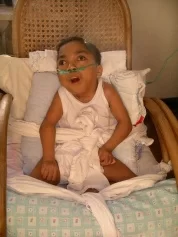 I asked them to reflect on his life. Here is why: I believe that God had a purpose for Luke's life when he created him. I believe that He uses people like Luke to teach us important things. But here is the rub: If we don't spend time reflecting on these lessons, then Luke's life is useless. Its up to us to allow God to make sense of Luke's life.
I asked them to reflect on his life. Here is why: I believe that God had a purpose for Luke's life when he created him. I believe that He uses people like Luke to teach us important things. But here is the rub: If we don't spend time reflecting on these lessons, then Luke's life is useless. Its up to us to allow God to make sense of Luke's life.
And what are the lessons that we found? What has God taught us through his life?
1. First, life is precious. Even though he had nothing to live for, from the world's point of view, Luke clung to live almost ferociously. Some of us who have much more to live for take life casually, we take life for granted. Not Luke. Every day was a struggle. Every breath had to be fought for. Life is a gift from God and we should treat it carefully.
2. God has provided us with opportunities, through Luke's life, to minister to him in significant and life-saving ways. He has provided an avenue for us to live out the biblical mandate to minister unto the "least of these," because, truly, Luke was in that category. Hundreds of people have been given a blessing to participate in the support of CSC that reaches out to children like Luke and many others with other special needs.
3. In so doing, He has given us a chance to show others a Godly value system that doesn't reserve love and attention for those who have something to give back, or who have "potential" or a bright future. For many people who live in a developing country, where resources are limited, this has been a difficult lesson to learn. How could we justify spending so much money for Luke's hospitalization when other, "normal" kids needed care? Luke's life gave us the opportunity to teach about the value of life and about how God looks at all of us.
4. Luke has been a tremendous ambassador for CSC. People around the world remember observing the loving care that he received by our staff and workers. They remember his famous smiles. They may quickly forget the names of the staff or other children, but they remember Luke. "How's Luke doing?" we get asked wherever we go to talk about the ministry of CSC. And our care of Luke helps us explain the true nature and core values of our work in the Philippines.
5. Luke has been a safety valve for those that had an opportunity to know him. My job as Field Director of CSC involves lots of administrative chores, like making budgets, government relations and various kinds of problem solving. There are days when I get stressed out and start to feel the weight of the world on my shoulders. But all I needed to do is to drive a few short miles to where Luke lived, to hold him in my arms, and I get a clear picture of what real struggles are all about. My struggles paled in comparison to what Luke faced every day. Self pity may be easy for some people, but those that knew Luke have no excuse for feeling sorry for themselves. What a great gift that was to all of us.
A little over a week before we left Cebu, Marlys called me on my cell phone and told me that I should get to the hospital quickly, as Luke wasn't doing well. He had been hospitalized for over a week and his breathing was bad. I had gotten messages similar to this one throughout Luke's life, so I went to the office and took care of a few things. But the Lord laid it on my heart to go see Luke and when I entered his room his breathing was extremely labored. He looked different than I had ever seen him, and it became clear that he was dying. I sat down next to him, kissed him and looked into his eyes. For 23 years we had loved this boy. It wasn't easy to say goodbye. I said to him, "Luke. You can go. Go to be with Jesus, Luke. I love you." Within a couple of minutes Luke took his last breath. 23 years of pain, suffering, limitations, hospitalizations, forced breathing, skin rashes and infections were over. We would never see Luke's smile again.
As Luke was dying in that hospital room, I made a promise. I'm not sure if I was making a promise to Luke, to God or to myself. But I decided then and there that I was going to talk about Luke on our coming furlough. I believed then and do now, that the church of Jesus Christ needs to hear about Luke, that the lessons of his life are important ones. Many Americans are complainers - full of self pity. People who have so many material comforts are unsatisfied. American discourse is increasingly a chorus of victim and entitlement claims. Charles Sykes, in his book "A Nation of Victims: The Decay of the American Character" states that, "in a nation where everyone is a victim, no one is a victim." In our preoccupation with our own needs we have a hard time seeing the needs of others – people like Luke.
In his song "God Help the Outcasts," the Hunchback of Notre Dame poses several difficult issues:
I don't know if there's a reason
Why some are blessed, some not
Why the few You seem to favor
They fear us, flee us,
Try not to see us.
The first part we have already examined. The second is our call to arms. "Why the few You seem to favor, they fear us, flee us, try not to see us."
I don't know what factors might make it difficult for us to see the needs of society's outcasts. Perhaps we are too busy. Maybe our personal and church calendars are so full that there just isn't room for Luke, or the man who had fallen to thieves at the side of the road, to break into our day. Maybe we are numbed or fatigued by the needs of others, or simply overwhelmed by the circumstances of our own lives. Maybe we have become cynical. "Why did that guy travel this road at this time carrying that amount of money? He deserves what he got!"
Maybe, just maybe, Luke can help cut through the apathy, the self-centeredness and cynicism of our lives. He was a person with significant needs that he didn't cause. He was totally dependent on others to live. His life had none of the possibilities and opportunities that we take for granted every day. He needed us so very much. Maybe Luke can serve as a symbol of many others that we come into contact with. Maybe Luke can help us rescue our lives.
Little Things
In science, the grade 3 students learned that a hand lens is a tool you can hold against your eyes to make little objects look bigger. It's amazing how these young scientists appreciate every little object and insect they can find and observe, which appears bigger through a hand lens. As their teacher, it was a great privilege for me to connect Psalm 8:4 ESV: "What is man that you are mindful of him, and the son of man that you care for him?" Often times, little things are neglected and overlooked simply because they appear insignificant. Even though we are just a speck of dust in this universe, the Lord is mindful of us, and He cares about every detail of His precious creation.
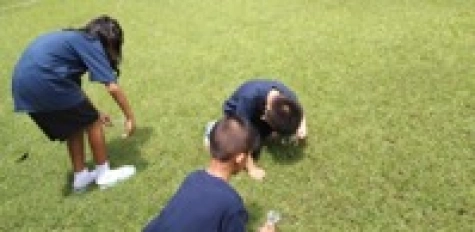
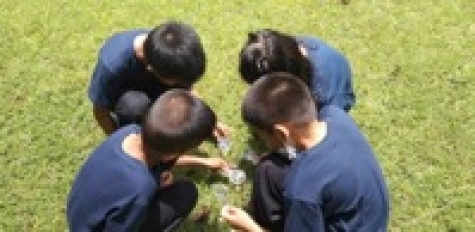
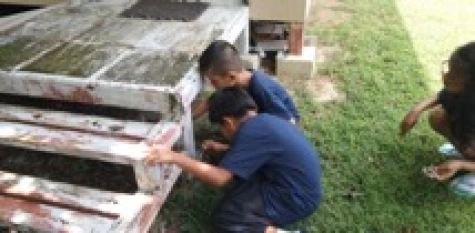
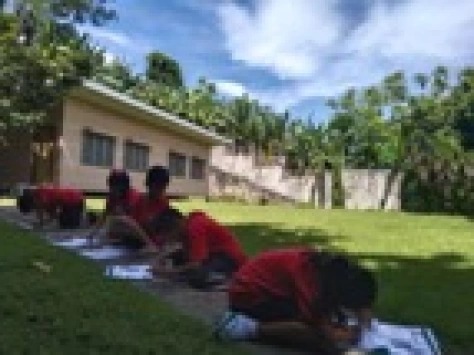
"Sometimes, little things make a big difference."― Nino Varsimashvili
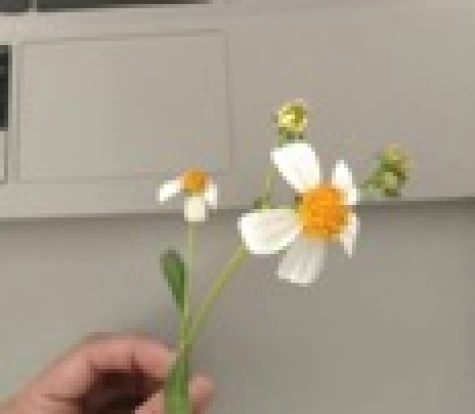
A student gave this lovely flower early in the morning with a beautiful smile while saying, "Good morning, Teacher!" It's simple and little things, that makes the teacher's day extraordinary!
Bright Future at Sun Valley
Getting rid of the old house is quite sentimental.
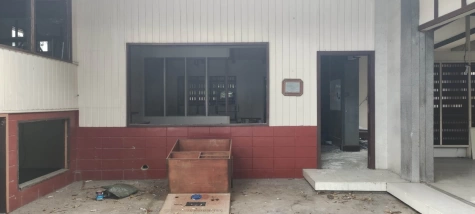
Welcoming the new one is monumental!
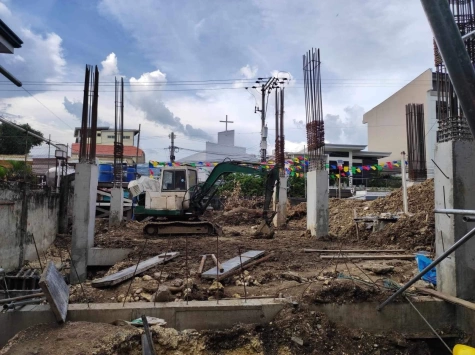
It's really a blessing from God and I am very excited for the residents to have this new home and for their bright future.

A Wonderful Day at the Library: Our First School Year 2023-2024 Adventure
Hello there, book lovers! I had an awesome experience with my students, who had the most amazing library visit ever in the new school year, 2023-2024. It was a day filled with laughter, learning, and curiosity.
The first-grade students gathered in the library, and they couldn't stop wondering what they witnessed. Shelves were piled high with books of all types, and they felt like they had entered a whole new world of possibilities. They also sat in those comfortable beanbags, eager for the adventure to begin.
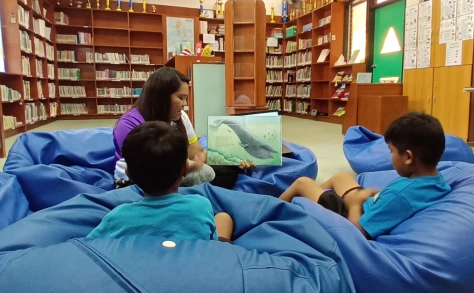
Teacher Merce, our librarian, accompanies them on this incredible journey; she began reading a fantastic story about a whale and a fish. Her voice was magical, bringing the story to life and taking the students on an underwater adventure.
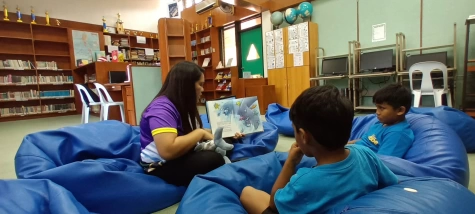
The students didn't just sit there quietly, they were completely captivated! They raised their hands, expressed their opinions, and even predicted what would happen next. It was a worthwhile discussion of the story, and everyone had a great time.
And guess what? One of the enthusiastic students said that he was excited to visit the library to borrow books and everyone nodded in agreement. That's incredible! It's as though he couldn't wait to dive into new stories and discover new things.
When the story wrapped up, the excitement wasn't over. Teacher Merce showed them around the library and introduced them to all the wonderful books they could explore. The students ran their fingers along the book spines, imagining all the cool adventures they could have by picking up a book.
You could see the light in their eyes as they exited the library. This was more than just a typical library visit. It was the beginning of a whole new journey. The students were excited to read, learn, and use their imaginations. Who would have thought that a simple visit to the library could be so exciting and full of possibilities?
The inspiring story of my students' first library visit this school year serves as a reminder that books are like keys that can unlock endless doors to imagination and knowledge. So, remember the adventure that awaits you the next time you visit a library!
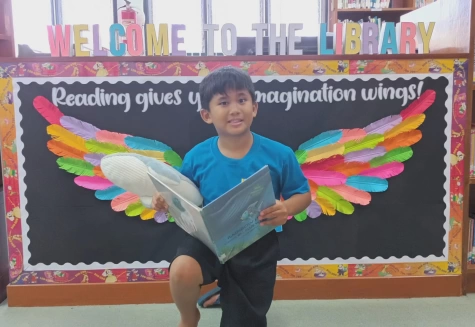
Clean Slate
In the golden morning light as the world begins to awake
We welcome you to our school with a warm and glad decree,
Your spirits rose to such heights during the sun-kissed days of summer.
Now, in the embrace of our school, we will soar to the skies together.
There seems to be a passion in every heart,
With backpacks full of aspirations and unbridled curiosity.
We'll spend the day learning as we read enthralling stories
With heroic characters who are strong and courageous.
We'll develop and play our role, like blossoms, fresh and green,
In numbers, shapes, and art, as well as in wonders yet unseen
In the magnificent flood of learning, teachers stand
At your side, holding and guiding each tiny hand.
Therefore, let the bells ring out in a chorus of delight,
Saying, "Welcome back, my dear," in the midst of insight.
May knowledge fill your heart, in this magnificent school hall,
To the beginning of a new chapter so welcome one and all!
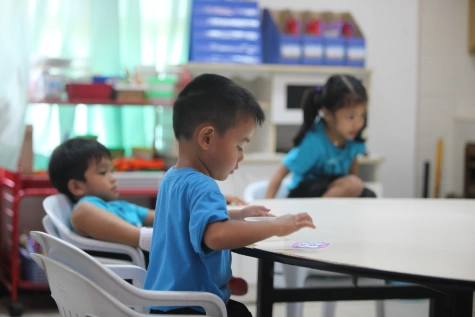
Padayon (to continue, move forward)
(names removed for privacy)
As adults, we typically abhor traffic. A commute that takes 3 or 4-times longer than usual would be exhausting, leaving us on the verge of tears or on the verge of calling it quits. There are, however, those rare occasions when traffic jams can be one of the most amazing, uplifting, and life-altering experiences.
Not long ago, I walked into the Eicher home as [John] and [Jane] were preparing their packed lunches. I closed my rain-soaked umbrella, set it by the door, and made my way towards the kitchen where they worked diligently and with purpose. In an hour, they would be leaving for their second day of school.
"Uncle Roberto, you won't believe what happened yesterday," yelled [Jane].
"Yeah, it took us almost two hours to get home," added [John]. "It was amazing!"
Initially, I was confused by their statements. Yesterday was their first day at the University of Cebu. In fact, I had gone to the Eicher Home specifically to ask them about it. How were their teachers? How was the campus? How was the commute? Judging by their words, their first day of school was awful, and yet they seemed overjoyed and anxious to get back.
"What happened? Tell me about it," I asked.
They proceeded to tell me that the rain wreaked havoc on the roads; not a single vehicle was moving when they started their commute home. On top of that, all the Jeepneys were full, but even if they could get onto one it would likely be stuck in the bumper-to-bumper traffic from downtown to Banawa. They told me that they, along with the other CSC residents that attend UC (7 in total) decided to start walking together towards home while keeping an eye out for open seats on a jeepney. They eventually made their way to One Pavilion in Guadalupe when they called a house father to come pick them up and bring them the rest of the way.
I was in shock, but they were overjoyed. As they were sharing their story, it became clear that the source of their excitement was rooted in a deep sense of accomplishment. In their minds and in their hearts, they had finally done it. They had been taught and trusted by their houseparents and all of us at CSC to commute to school on their own, and they were able to accomplish the task on their first try, on their very first day, and in the face of difficult circumstances. In that moment, they had taken a big step towards independence and adulthood. Plus, they were able to experience something that, in many ways, is quintessentially Cebuano and quintessentially Filipino; something that they had heard every adult, every laborer, every taxi and jeepney driver, every Auntie and Uncle at CSC complain about. They were able to experience traffic, and like responsible adults, they didn't give up. They found a way to make it home, finish their schoolwork, and prepare themselves to do it all over again.
As I bid them farewell and opened my umbrella, I couldn't help but wonder what new and amazing things their second day of school would bring.
